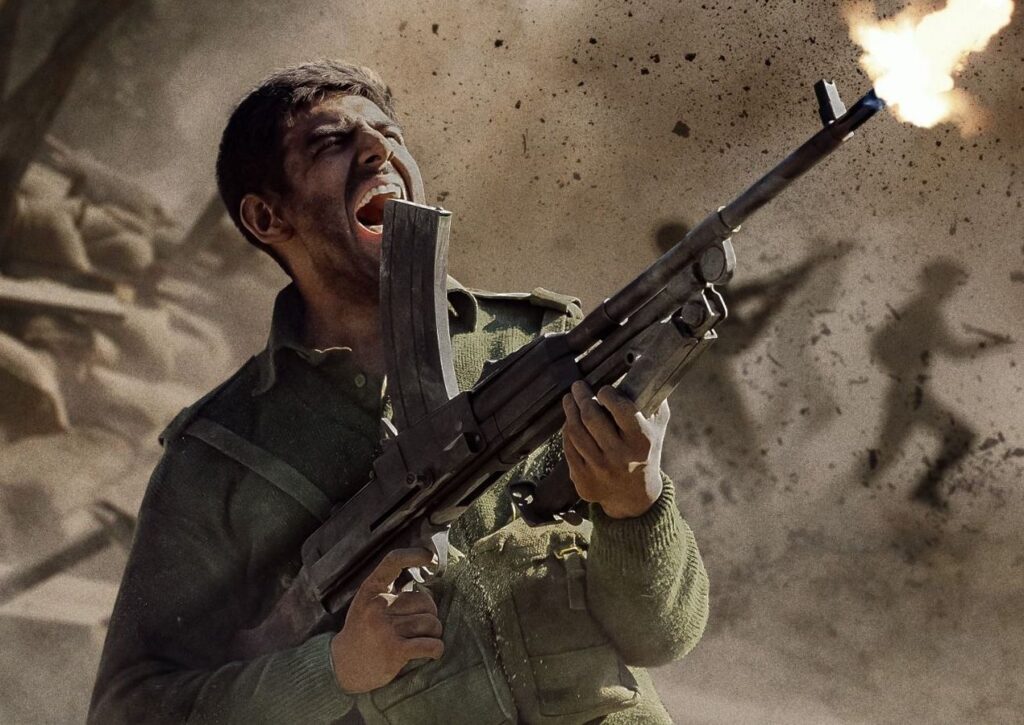Chandu Champion , directed by Kabir Khan, tells the real life story of Murlikant Petkar (Kartik Aaryan) and explores his trials and tribulations to become India’s first Paralympics gold medallist in 1972. Despite a relatively weak central performance by its leading man, the film has its moments even as it ticks almost all the checkpoints of the triumph-of-the-underdog template.
If one looks through the Wikipedia page on Petkar, the real-life athlete on whom Chandu Champion is based, one would be boggled by his story. Before the 1965 war against Pakistan, where he sustained nine bullet wounds with one remaining lodged in his spine for the rest of his life, he was a boxer for the Corps of Electronic and Mechanical Engineers (EME), Secunderabad. After he was crippled, he switched to other fields, participating in tennis at the 1968 Paralympics and winning four medals – including a gold – in swimming at the ’72 Paralympics.
Chandu Champion brings to light how much the success of an athlete’s life becomes a catnip for Bollywood to convert it into a biopic. But by putting such a fascinating story into a templated plot, one runs the risk of being bogged down by extraneous details that need to be included for the commercial prospects of the film. That is the case mostly with Chandu Champion as well.
That said, there are moments where the film truly scores. A primary reason could be the supporting cast filled with fine artists like Vijay Raaz, Rajpal Yadav, Shreyas Talpade and even a relative newcomer like Bhuvan Arora. One is decidedly impressed with the child actor playing the younger version of Petkar and how his anger and passion at attaining a gold medal sets up the emotional thread that would be the guardrail the film would take support of. His cry of “Hasta Kyun Hai Re?” is the fire that Aaryan’s older version truly takes the torch from and models his iteration after.
It’s important to underscore how the supporting actors being great at their jobs become essential once Aaryan enters the picture. He is quite limited as an actor, choosing to lean into his shtick of earnest comedy resembling madness, or intensity via stony visage. But fortunately, Khan understands how to utilize actors with a limited range (Salman Khan in Bajrangi Bhaijaan (2015)). Still, Aaryan is downright irritating at times when he chooses to lean into comedic gags related to cultural barriers (his unfamiliarity with English or his attraction to a very pretty Indian reporter distracting him from his aim) but Bhuvan Arora as Carnail Singh manages to steer those sequences into something manageable. Similarly, Vijay Raaz, as the stern coach, is brilliant when his stony visage transforms into glee or surprise. Rajpal Yadav is in fine form in a limited role as the caretaker at IHNS, Ashwani Hospital, where Petkar would later be admitted for recuperation.
It’s a failure of Khan’s direction and the script that the first half is so predictable with Petkar never feeling like the underdog in the ring until the plot demands it. A similar issue lies with the montage sequence in the first half, which foregoes detail orientation in favour of templatized training sequences. But the boxing sequences in the ring are quite well choreographed, and Aaryan too handles himself reasonably well here.
The second half is where Khan’s direction soars due to the inherent story itself being quite compelling. The climactic sequence where Petkar wins the swimming gold medal is easily one of the better parts of the film. Petkar, in the middle of the final race, is reminded of his past experiences related to water such as stones being thrown at him while escaping his village or bullets piercing through the water, reminding him of his time in the war. The scene is further enhanced by Chatterjee’s evocative cinematography and the effective use of color to depict the sequences of the past as visions that Petkar visualizes.
From a technical standpoint, the editing lends an episodic flair to events. The showcasing of the 1965 war and how that led to Petkar sustaining nine bullet wounds – done via an apparent one-take sequence – is thrilling enough but let down by the sometimes tacky VFX. Pritam’s album is one of the more unremarkable outputs by the music director while Julius Packiam’s score and sound design maintain consistency and thankfully, do not overpower every scene. Contrary to most Bollywood films, where the sound mix almost distracts you from the experience, the sound mix here complements the narrative to a certain extent.
Chandu Champion doesn’t have the ambition to be anything more than what the typical biopic template demands. What’s more, a better actor might have elevated the movie a notch or two. Still, judging from what is presented to us, there is enough sturdiness in the film that renders it pretty watchable.
Hindi, Drama, Biopic, Color


